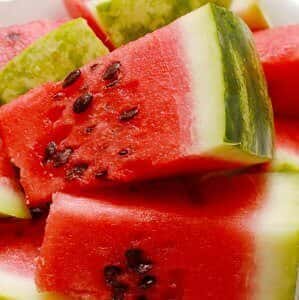
Paying attention to your body and how it reacts to foods is an important step to figuring out what you should be eating and what you should avoid. Even foods that are full of nutrients are not necessarily right for everyone, though one young woman has had a hard time convincing her mother that she needs to stay away from melons. For most people, these are delicious and nutritious, but for her they could spell danger.
Q. My daughter claims that eating any kind of melon makes her throat itch terribly. She tried a piece of watermelon recently, and it bothered her. She won’t eat cantaloupe or honeydew for this reason. I hate it that she is missing out on these wonderful melons. Is this really a problem?
A. It sounds as if your daughter has developed a melon allergy and should avoid eating them to prevent a potentially serious reaction. People who are allergic to melons may also react to pollen, especially ragweed. They sometimes develop allergies to other fruits such as peaches and to latex (Annals of Allergy, Asthma and Immunology, Sept. 2003).
Should your daughter need surgery she should be tested for latex allergy beforehand. Someone with this type of allergy could suffer a life-threatening reaction if exposed to latex gloves.
Latex Allergy Experience:
One reader shared this frightening experience with latex allergy:
“After 20 years working in the hospital environment, I was diagnosed with a Type 1 Latex Allergy or Immediate Sensitivity Immune Response. I carry an EPI-pen and Benadryl and avoid any and all latex exposures.
“There is no skin test available in the United States. Diagnosis involves a thorough history of childhood illnesses, allergies and surgeries along with current diagnoses, allergies and medications. History of latex exposure during childhood is important as well as exposure during education and employment. A licensed allergist in your area is the best place to get an unbiased diagnosis.
“Reactions vary from individual to individual. Red irritated skin can occur with or without swelling when there is physical contact. Stomach upset and changes in bowel patterns can be related to food interactions.
“There is a list of six foods to avoid: Bananas, kiwi, papaya, potatoes (raw), chestnuts and mangos. Once ingested, the proteins in these foods can cause the body to react as if they were latex. Itchy and/or red eyes, sneezing, persistent coughing or wheezing can signal a more serious reaction and often occur when exposed to airborne latex (when powdered latex gloves are removed).
“There is no cure for latex allergy; there is only treatment of symptoms and avoidance of the allergen. Each exposure increases the risk of anaphylaxis. Please, notify all of your healthcare providers (doctors, dentists, clinics and veterinarians too) of your sensitivity so they can assist you with safe care and help you to obtain appropriate treatment.”
You will note that melons are not on our correspondent’s list. They are less likely to be linked to latex allergy, but the connection is possible and could be extremely dangerous. Have your daughter be alert for this risk.

